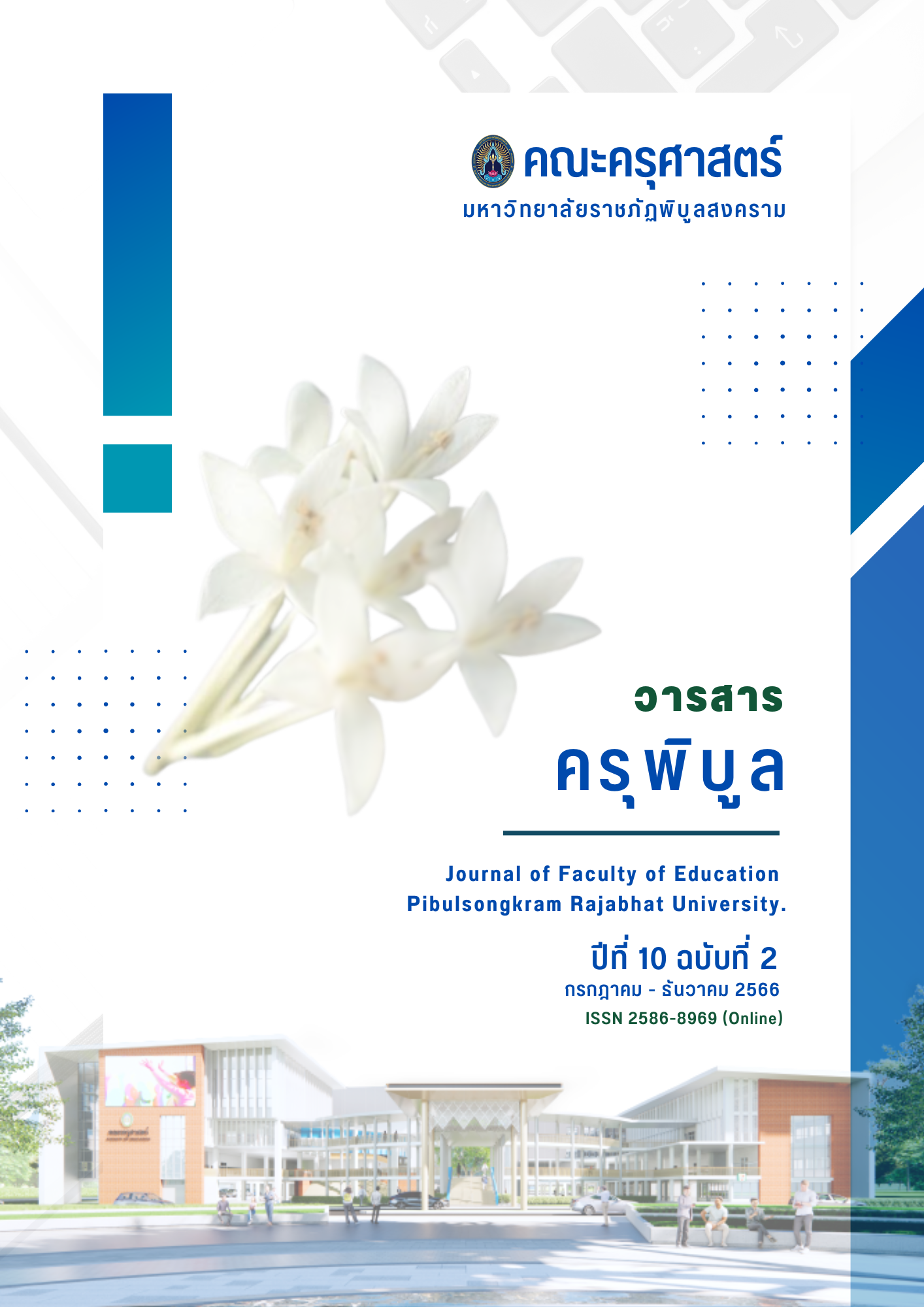COMPONENTS OF A LEARNING MANAGEMENT PROCESS BASED ON INNOVATIVE RESEARCH COMPETENCY FOR THE DEVELOPMENT OF STUDENT TEACHERS' POTENTIAL: THE STAKEHOLDER PERSPECTIVES
Keywords:
competency-based learning management, innovative research, student teachersAbstract
This research aims to study the components of the development of a learning management model based on innovative research competency for the development of student teachers' potential. This research is qualitative research. In-depth interviews were used to collect data with 6 key informants involved in student teachers’ development in dimensions of student teacher production and development and dimensions of superiors and student teacher developer. Research tools were a semi-structured interview with pre-arranged main points, sub-issues, and interview lines implemented relevant literature as a guideline to formulate questions and to check quality tools through expert consideration of giving recommendations and improvements related to content validity.
The results found that learning management process based on innovative research competency for student teachers’ potential development has 5 components: 1) Curriculum which are course design, curriculum implementation and monitoring in usage of competency-based curriculum 2) Learning activities design which are adjusting mindset of student teachers, designing learning activities according to active learning principles filled with real-life examples and practical hands-on activities, summarizing of knowledge at the end of class and providing presentation and dissemination of research findings 3) Instructor roles in having knowledge and understanding of competency-based learning, coaching and giving feedback, reflection, reinforcement, motivation, and follow-up and organizing learning process in the form of a learning community 4) The role of mentoring and coaching in schools: school-based research centres and local consultants for student teachers 5) Classroom Assessment: formative assessment focused on assessments of student progress and learning empowerment.
References
กอบกุล รายะนาคร. (2543). กฎหมายกับการจัดการทรัพยากรน้ำและชายฝั่งทะเล. ใน อานันท์ กาญจนพันธ์ (บ.ก.), พลวัตชุมชนในการจัดการทรัพยากรกระบวนทัศน์และนโยบาย. (น. 395). สำนักงานกองทุนสนับสนุนการวิจัย (สกว.).
คณะกรรมการอิสระเพื่อการปฏิรูปการศึกษา. (2562). “รายงานพันธกิจด้านการปฏิรูปการศึกษา ผ่านหลักสูตรและการเรียนการสอนฐานสมรรถนะ. คณะทำงานวางแผนจัดทำกรอบสมรรถนะหลักผู้เรียนระดับการศึกษาขั้นพื้นฐานในคณะอนุกรรมการการจัดการเรียนการสอน.” https://www.thaiedreform.org/wp-content/uploads/2019/08/Core_competency_11.pdf.
ตรีคม พรมมาบุญ และคณะ. (2563). การพัฒนาระบบการทดสอบสมรรถนะหลักของผู้เรียนระดับ ประถมศึกษาตอนต้น เพื่อส่งเสริมการยกระดับคุณ ภาพผู้เรียนในศตวรรษที่ 21. สถาบันทดสอบทางการศึกษาแห่งชาติ (องค์การมหาชน).
ชญานิษฎ์ รุ่งรังสี. (2549). แผนการจัดการเรียนรู้แบบ active learning วิชา 10000101 พฤติกรรมมนุษย์กับการพัฒนาตน หน่วยที่ 2 เรื่อง การพัฒนาตนเอง. มหาวิทยาลัยราชภัฏนครสวรรค์.
พระมหาสุทิตย์ อาภากโร. (2547). เครือข่าย: ธรรมชาติ ความรู้ และการจัดการ. โครงการเสริมสร้างการเรียนรู้เพื่อชุมชนเป็นสุข (สรส.).
พระราชบัญญัติสภาครูและบุคลากรทางการศึกษา พ.ศ. 2546. (2546, 6 มิถุนายน). ราชกิจจานุเบกษา. เล่มที่ 120 ตอนที่ 52 ก. หน้า 1-30.
วิชัย วงษ์ใหญ่ และมารุต พัฒผล. (2557). กระบวนทัศน์ใหม่การ Mentor and Coaching ในสังคมสื่อสารสารสนเทศเพื่อเสริมสร้างศักยภาพนักศึกษาฝึกประสบการณ์วิชาชีพครู. มหาวิทยาลัยศรีนครินทรวิโรฒ.
สุวิมล ว่องวาณิช. (2562). ปาฐกถานำ เรื่อง การวิจัยกับความเป็นครูมืออาชีพ. [นำเสนอที่ประชุมวิชาการด้านการศึกษาระดับปริญญาบัณฑิตเพื่อส่งเสริมความเป็นเลิศด้านการวิจัย (EUS) คุรุปัญญา โดยคณะครุศาสตร์ จุฬาลงกรณ์มหาวิทยาลัย วันที่ 19 เมษายน 2562 ห้องพระมิ่งขวัญชั้น 2 อาคารพระมิ่งขวัญการศึกษาไทย].
สำนักทดสอบทางการศึกษา สำนักงานคณะกรรมการการศึกษาขั้นพื้นฐาน. (2554). แนวทางการประเมินคุณภาพตามมาตรฐานการศึกษาขั้นพื้นฐาน เพื่อการประกันคุณภาพภายในของสถานศึกษา. สำนักงานคณะกรรมการการศึกษาขั้นพื้นฐาน.
Petty, R. E., Southwood, T. R., Manners, P., Baum, J., Glass, D. N., Goldenberg, J., & International League of Associations for Rheumatology. (2004). International League of Associations for Rheumatology classification of juvenile idiopathic arthritis: second revision, Edmonton, 2001. The Journal of rheumatology, 31(2), 390-392.
Resnick, L. (1991). Shared cognition: Thinking as social practice. In W. Resnick, J. Levine, & S. Teasley (Eds.), Perspectives on socially shared cognition (1-22). American Psychological Association.
Shenker, S., Clark, D., Estrin, D., & Herzog, S. (1996). Pricing in computer networks: Reshaping the research agenda. ACM SIGCOMM Computer Communication Review, 26(2), 19-43.
Downloads
Published
Issue
Section
License
Copyright (c) 2023 คณะครุศาสตร์ มหาวิทยาลัยราชภัฏพิบูลสงคราม

This work is licensed under a Creative Commons Attribution-NonCommercial-NoDerivatives 4.0 International License.
ลิขสิทธิ์เป็นของคณะครุศาสตร์ มหาวิทยาลัยราชภัฏพิบูลสงคราม


